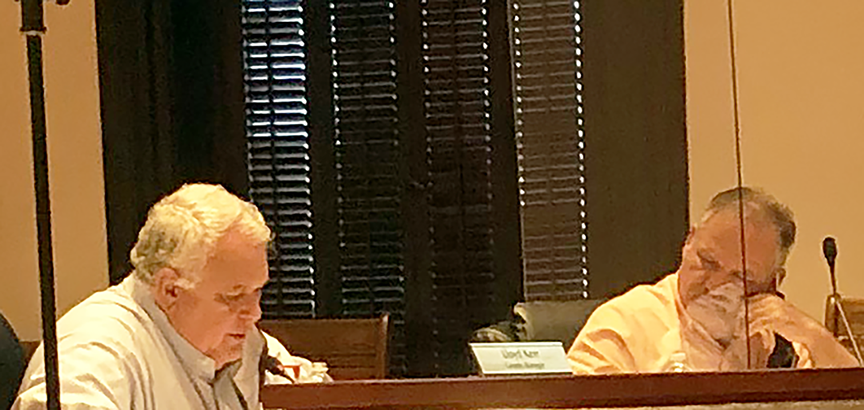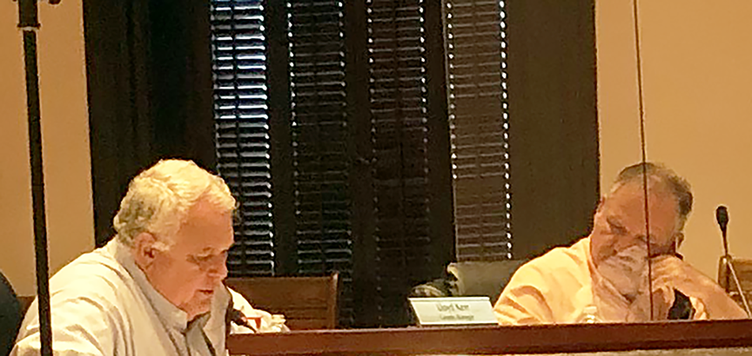COVINGTON, Ga. — Some commissioners say they may want to consider changes to the county government’s management structure after the person they hired to lead its day-to-day operations asked them to "go through me" before contacting employees in the future.
Commissioners Aug. 3 voted to delay action on a resolution stating that county commissioners "shall deal with county officers and employees" solely through the county manager if the employees are under his supervision.
Chairman Marcello Banes said he believed the issue was "cut and dried."
"The Board of Commissioners has had communications and given directives to some county employees," Banes said. "I think (County Manager Lloyd) Kerr is asking that we eliminate that. It's been causing some issues."
But District 2 Commissioner Demond Mason said he believed there "should be some amendment" to the government’s organizational document to allow commissioners to have direct communication with department heads.
"At a minimum I believe the Board of Commissioners should be able to reach out to the director of any department and not necessarily have to go through our county manager," he said.
District 4 Commissioner J.C. Henderson also said he wanted to consider changing the document to allow "at the very least" the chairman and vice chairman to "talk to the employees" now under the county manager's supervision.
The resolution is in accordance with the enabling legislation the Georgia General Assembly approved in 2016 that changed the county government to a commission-manager form in January 2017.
Kerr said the 2017 legislation designated the county manager position as direct supervisor for heads of departments other than those led by the Board of Commissioners or the four constitutional officers — sheriff, Probate judge, clerk of courts and tax commissioner.
It also spells out the division of duties, with board members being the policy-making arm and responsible for the government's executive functions, and the county manager leading day-to-day operations and supervising employees.
"There have been occasions when, quite frankly I think there's been maybe a few things where there've been some issues," Kerr said.
"I think it's best to simply remind everybody that anything related to operations would need to go through me," he said.
Kerr did not give details but said some lines "have been crossed" between specified duties of commissioners and the county manager and "it's best to address it before we have any more."
"I think it's best for all," Kerr said.
County Attorney Megan Martin said the enabling legislation does not prohibit commissioners from contacting county employees.
"It does not say you can't go to an employee in this form of government," she said.
"It's a resolution to stop interference or other unwanted communications or those things that would occur with a county employee," Martin said.
The enabling legislation states, "Except as otherwise provided in this Act, members of the board shall not contact employees or personnel of the county in relation to any duty or work habits of said employee, or to request any service or actions on the part of said employee except through the county manager."
It also states that it "shall not limit contact by members of the board as a matter of inquiry to obtain information necessary to allow said members to carry out their duties."
Mason said he often contacts department heads directly because he receives numerous questions about zoning and recreation. He said he then copies Kerr and Chairman Marcello Banes on his emails with the department heads.
Mason said, in the past, Kerr had directed him to speak with the department head if Kerr did not know the answer.
Commissioner Alana Sanders said Kerr's resolution was unnecessary because it merely restates what the enabling legislation already says.
Commissioner Stan Edwards said he agreed the "integrity of the chain of command" needed to be maintained. He said "nothing undermines" it more than an employee "thinking they have more than one boss."
However, he admitted he was guilty of bypassing Kerr and directly contacting employees.
Kerr told the commissioners some of the 600 employees he leads "kind of look at you all as very special people who have a tremendous amount of power."
Some employees were "easily intimidated" when commissioners contacted them directly with any number of requests for their districts, Kerr said.
"While I know you don't mean to be intimidating, sometimes it does come across that way to them," Kerr said.
"There's also a lot of times when an employee may agree to something that they don't necessarily have the ... authority to agree to or they may not know there's some other plan of action," he said.
The Board tabled the resolution until Sept. 7 to discuss and make any additions they wanted in order to take final action on Kerr's resolution.






